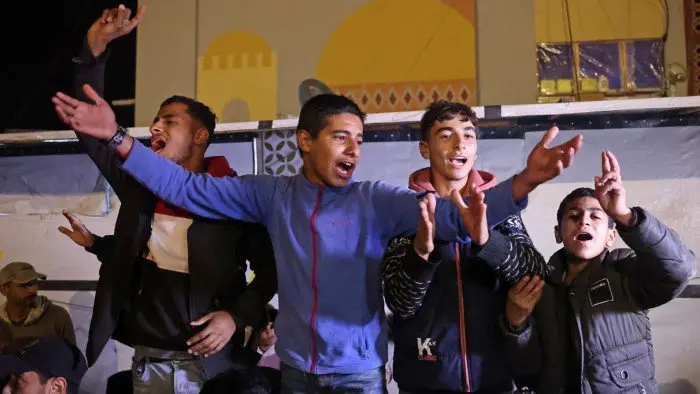Israel and Hamas have agreed to a ceasefire to end the 15-month war in Gaza and release the remaining hostages, mediators said, raising hopes of an end to a devastating conflict that has roiled the Middle East and the world beyond .
But despite the celebrations erupting across the region, Israeli Prime Minister Benjamin Netanyahu’s office warned that some details still needed to be clarified by Wednesday evening.
The multi-stage agreement, set to come into force on Sunday, a day before Donald Trump takes office as US president, was announced by Qatari Prime Minister Sheikh Mohammed bin Abdulrahman bin al-Thani. However, he noted that the parties still need to give final approval.
The agreement offers hope for an end – and possibly an end – to a brutal war that has become the deadliest chapter in the decades-long history of the Israeli-Palestinian conflict, leaving Gaza in ruins, devouring Israeli society and putting pressure on the Middle East the brink of a full-scale war.
The fighting was triggered by Hamas’ attack on Israel on October 7, 2023, in which fighters from the militant Palestinian group killed 1,200 people and took 250 hostage – the deadliest day for Jews since the Holocaust.
Israel responded with an offensive in Gaza that killed more than 46,000 people and triggered a humanitarian catastrophe in the enclave.
Previous attempts by the United States, Qatar and Egypt to negotiate a deal to end the conflict and secure the release of the 98 mostly Israeli hostages still in Gaza – not all of whom are alive – had repeatedly failed because Israel and Hamas refused to make the necessary concessions.

But the re-election of Trump – who threatened there would be “hell to pay” if the hostages were not released before his inauguration – injected new momentum into long-stalled talks.
Trump was among the first world leaders to applaud the deal on Wednesday, writing on his Truth Social platform ahead of the official announcement: “We have a deal for the hostages in the Middle East. IT WILL BE RELEASED SHORTLY.”
He added that his national security team would “continue to work closely with Israel and our allies to ensure that Gaza NEVER again becomes a safe haven for terrorists.”
In his own comments welcoming the agreement, US President Joe Biden described the Doha talks as “one of the toughest negotiations I have ever experienced”.
He added that the agreement would “end the fighting in Gaza, increase urgently needed humanitarian assistance to Palestinian civilians and reunite the hostages with their families after more than 15 months in captivity.”
Netanyahu’s office said he spoke with Trump on Wednesday evening and thanked him for his help in releasing the hostages. The two had agreed to meet “soon” in Washington.
The statement added that Netanyahu was “committed to returning all hostages to the best of his ability.” Netanyahu also thanked Biden.
Previously, the Israeli prime minister’s office said several sections of the agreement remained “open.” . . and we hope the details will be finalized this evening.”
He later added that Netanyahu would not make an official announcement about the deal until “the details of the agreement are finalized.”
A person involved in the talks said the agreement came after the Qatari prime minister met separately with Hamas and Israeli negotiators in a final attempt to reach an agreement.
However, the person added that while Hamas had agreed to the deal, giving in to one of its final demands, Israel had since “raised a new open question.” They said: “Mediators are working to resolve the issue.”
An Israeli official said the outstanding details that Netanyahu’s office said still needed to be resolved related to the identities of the Palestinian prisoners to be released in exchange for hostages.
The Israeli government is expected to vote on the agreement, which is based on a three-stage proposal that Biden first outlined last year. Far-right ministers, including National Security Minister Itamar Ben-Gvir, have spoken out against it but are not expected to be able to block the deal.
The first phase includes a 42-day ceasefire in which 33 Israeli hostages – including children, all female prisoners, the sick and the elderly – are released in exchange for Palestinian prisoners held in Israeli prisons and deliveries of humanitarian aid dramatically increase in Gaza.
The two parties would begin negotiations on the second phase no later than the 16th day of the ceasefire. During this time, the remaining hostages, including male soldiers, are expected to be released in exchange for additional Palestinian prisoners.
If fully implemented, the second phase would also lead to a permanent ceasefire and the complete withdrawal of Israeli troops from Gaza.
The final phase would include the return of all remaining bodies of the deceased hostages and the reconstruction of Gaza under the supervision of Egypt, Qatar and the United Nations.
Talks intensified in mid-December following a ceasefire between Israel and Hezbollah in Lebanon.
A senior Biden administration official said one issue hampering the completion of the talks was Hamas’s refusal to disclose how many hostages it was holding and which would be released in the first phase.
The Palestinian group agreed to a list of about 33 hostages in late December, accelerating the completion of talks.
Biden’s top Middle East adviser Brett McGurk was accompanied by Trump’s Middle East envoy Steve Witkoff in the final days of negotiations. A senior Biden administration official called finalizing the deals “a historic and critical partnership.”
The talks continued into the early hours of Wednesday morning, with McGurk, Witkoff and Egyptian and Qatari officials sitting upstairs with Israeli negotiators and Hamas downstairs, jotting down dozens of details.
The mediators will hold a meeting in Cairo on Thursday that will focus on “the implementation of the agreement in all aspects,” a U.S. government official said.
Abu Shukri, a community organizer seeking refuge in Gaza’s Maghazi refugee camp, said people in the neighborhood lined the streets and balconies in anticipation of the ceasefire agreement announcement. When the news reached them, people shouted and shot into the air in celebration.
“We just thank God,” Abu Shukri said of the news. “But we gave to our children, we gave to our parents.”
Additional reporting by Malaika Tapper in Beirut and Neri Zilber in Tel Aviv





